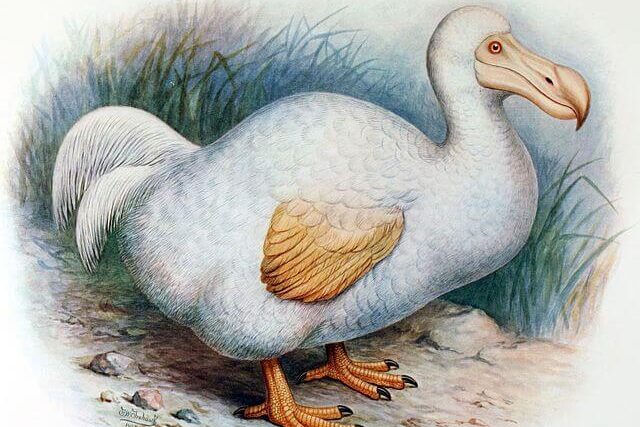
New research reveals that approximately 12% of the world’s bird species, double the previous estimates, have succumbed to extinction due to human activity.
Published in Nature Communications, the study estimates that around 1,430 bird species have disappeared since the Late Pleistocene period, starting about 120,000 years ago.
While fossil or other records identify roughly 640 known bird extinctions, the study introduces the concept of “dark extinction,” referring to species that went extinct without being recorded.
“We know we have lost iconic birds like the dodo, but we wanted to get a better estimate of the bird extinctions we didn’t know about,” said Dr Rob Cooke, an ecological modeller at the UK Centre for Ecology and Hydrology and the paper’s lead author.
Dr. Rob Cooke, the lead author and an ecological modeller at the UK Centre for Ecology and Hydrology, used a statistical model to extrapolate the number of unknown extinctions from the known 640. Using New Zealand as a baseline with zero unknown extinctions, they estimated the number of undiscovered extinctions by subtracting known extinctions and the remaining living birds from the total bird species on an island.
“New Zealand was the benchmark, it has the most complete bird record based on found fossils and bird observations, so that is the zero point, there is nothing unobserved in New Zealand.”
The study focused on island bird populations, particularly non-migratory birds, as they face challenges in dispersal. “Islands are the best place to study extinctions: 90% of extinctions are on islands, because island birds have nowhere else to go,” Cooke said.
Deforestation, overhunting, fires, and invasive species emerged as key contributors to bird species loss.
The research suggests that the new estimate of 1,430 bird species may be conservative, potentially underestimating the actual extent of bird extinctions. “The losses could be even higher, maybe up to 2,000, but we wanted to be conservative.”
Notably, major extinction events occurred in the 14th century, marking the largest human-driven vertebrate extinction wave reported to date, fuelled by human settlement, deforestation, and the introduction of invasive species.
High numbers of bird extinctions, the paper says, are a loss for “our understanding of avian species richness, ecological diversity and evolutionary history”.
“The world is emptier than we realise,” Cooke said. “And these missing birds are a loss to our imagination.”
Beyond the loss of species, the study highlights the overlooked roles birds play in ecosystems, such as seed dispersal, pollination, carcass cleanup, and fertilisation of coral reefs and land with their droppings.
Known bird species losses, the paper said, include “extinct megaherbivores such as the elephant birds (Aepyornithidae) of Madagascar, which influenced plant structure and diversity and ecosystem dynamics, extinct aerial predators such as Haast’s eagle (Hieraaetus moorei), and extinct seed-dispersers such as Seychelles parakeet (Psittacula wardi).”
Dr Alexander Lees, a reader in biodiversity at Manchester Metropolitan University, who was not involved in the research, said: “That the study convincingly shows we have mismeasured the avian extinction crisis does not surprise me at all. Most birds have very small bones and don’t fossilise easily; many islands are not conducive to fossil formation; and in many places no one has looked for fossils at all.”
The estimated bird extinction rate tallied with recent estimates of mollusc extinctions, he said, and was “a useful way of approximating the extinction crisis and understanding what we have lost”.
Dr. Cooke emphasises the ongoing risk of future extinctions if current trends persist. The team’s prior research suggests the potential loss of 669 to 738 bird species in the coming centuries, driven by the climate crisis, diminished food sources, and deforestation. Understanding the extent of the extinction crisis becomes crucial in safeguarding biodiversity and ecosystems.
“Recent conservation has saved some species, and we must now increase efforts to protect birds with habitat restoration led by local communities,” he said. The future for bird species “is up to us”, he added.
——————————————————————————
At Natural World Fund, we are passionate about stopping the decline in our wildlife.
The decline in our wildlife is shocking and frightening. Without much more support, many of the animals we know and love will continue in their decline towards extinction.
When you help to restore a patch of degraded land through rewilding to forests, meadows, or wetlands, you have a massive impact on the biodiversity at a local level. You give animals a home and food that they otherwise would not have had, and it has a positive snowball effect on the food chain.
We are convinced that this is much better for the UK than growing lots of fast-growing coniferous trees, solely to remove carbon, that don’t actually help our animals to thrive.
This is why we stand for restoring nature in the UK through responsible rewilding. For us, it is the right thing to do. Let’s do what’s right for nature!
Donate today at https://naturalworldfund.com/ and join in the solution!

